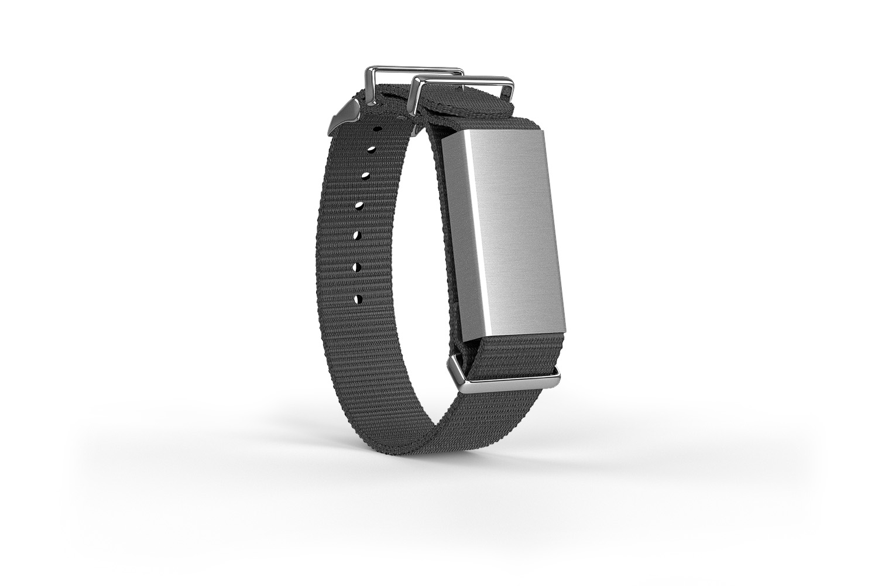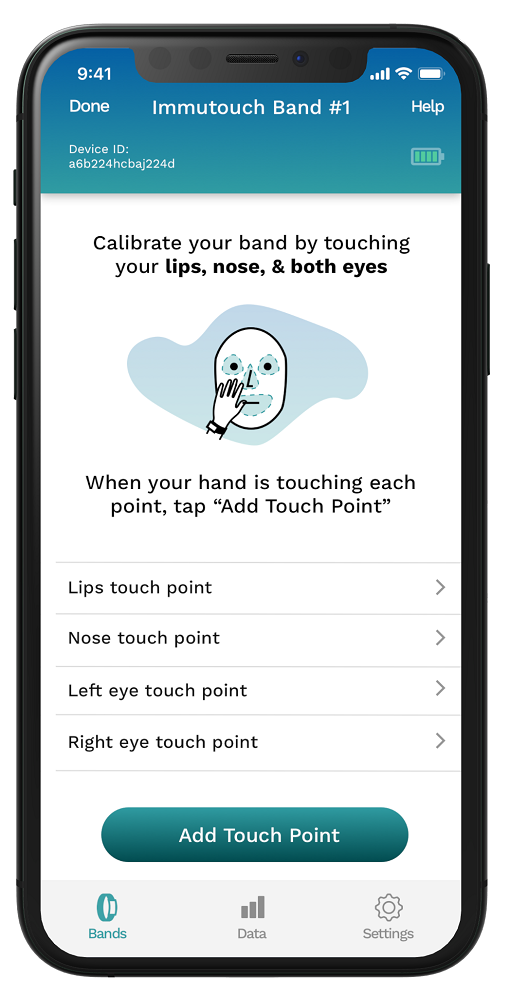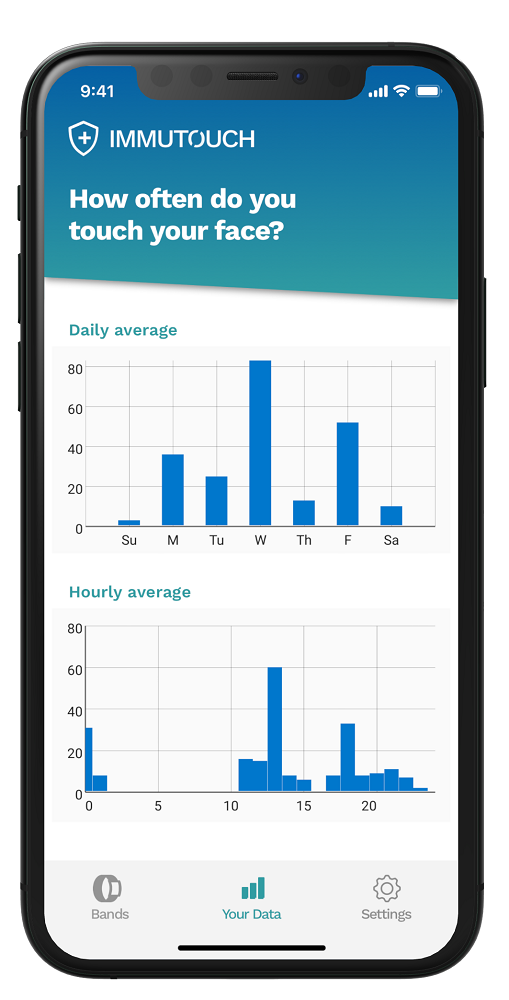Lavin Program entrepreneur retools wearable device to help fight spread of COVID-19
Stop touching your face!
That familiar admonition was once aimed almost exclusively at grubby-handed kids. Now it has become a dead-serious public health message for all of humanity as we try to slow the spread of the novel coronavirus that has created a global pandemic.
It’s a directive that’s not as easy to observe as it might seem. We’re all prone to unconscious facial fondling (23 times an hour, on average, according to a recent study).
Now a Seattle startup called Slightly Robot, co-founded by a recent graduate of the Lavin Entrepreneurship Program at the UW Foster School of Business, is adapting its innovative wearable technology to respond to the threat of COVID-19.
 The Immutouch is a simple solution based on sophisticated motion-sensing tech: a smart wristband that vibrates when your hand gets too close to touching your eyes, nose or mouth.
The Immutouch is a simple solution based on sophisticated motion-sensing tech: a smart wristband that vibrates when your hand gets too close to touching your eyes, nose or mouth.
Sales of the device are growing, well, virally (which is especially remarkable given that the concept didn’t even exist two weeks ago).
Demand curve
Over their first three years in business, Slightly Robot founders Matthew Toles, Joseph Toles and Justin Ith (BS 2017)—an alumnus of the Lavin Program at the Buerk Center for Entrepreneurship—had developed and marketed a wristband designed to mitigate behaviors such as compulsive hair pulling, skin picking and nail biting.
 “And then COVID-19 happened,” says Ith.
“And then COVID-19 happened,” says Ith.
After the first U.S. death was recorded in the Seattle area in early March, the team decided to redesign its technology to detect facial touching, which is a major vector for transmission of the virus.
Immutouch zoomed from concept to product launch in seven days. During that blistering hackathon, the trio developed two mobile apps and retooled their original gravimeter-enabled device to custom calibrate the positions on a person’s face and sensitivity of movements that trigger a vibration—a sentient reminder to keep your damn hands off.
The Immutouch was released on March 9. Within days, news of it was everywhere.
GeekWire first announced its launch to the public. Then it was featured on TechCrunch, MSN, Yahoo! Finance, Forbes, El Mundo and Fox Business. And orders flooded in.
Ith and his partners assembled many of their first 350 by hand with existing inventory of parts. For the next wave, set to ship in early April, they are employing a small army of workers whose jobs in the service or events industry have been destroyed by COVID-19.
“This allows them to get some hours to help pay the rent while building a bracelet that combats the thing that took their job,” Ith says.
He’s also in talks with suppliers to ramp production upwards of 50,000 units in short order. The demand is certainly there—both individual and wholesale, from Seattle to Seville to Seoul.
Ith to the nth
At the UW, Ith studied informatics, but also found a home at the Buerk Center. He was president of the UW-wide Lavin Entrepreneurship Program and co-founded the student group Startup UW. Through Buerk, he worked on three startups and did nine internships, many at new ventures. “Entrepreneurship and startups were my world,” he says. “It’s where I thrived.”
After school he rolled right into Madrona Venture Labs, where he was a product lead, advising multiple companies in the artificial intelligence space.
He helped co-found and secure more than $3 million in seed funding for Uplevel, a Madrona Venture Labs spinout that creates tools to measure the productivity and attitude of engineering teams.
Then a year ago, the Toles brothers, friends from his UW days, approached Ith to help launch and scale their Slightly Robot concept. He jumped at the chance to marry his training in human/computer interaction and his expertise in entrepreneurial development for a product that could do a lot of good in the world.
It’s personal
Ith was inspired to develop the company’s original device, but became even more intimately invested in Slightly Robot when the COVID-19 crisis began. His father, who’s in his 60s, is on medication to fight an autoimmune disease that leaves him especially vulnerable to the kind of viral infection that this novel coronavirus presents.
And, despite being young and generally healthy himself, Ilth suffers from asthma, heightening his own risk for complications should he contract COVID-19.
“Those were big motivations to build this thing,” he says.
The long view
 The Immutouch team is building quickly, to serve a seemingly endless and urgent market. But they’re not looking to take advantage of a panicked public. A breakown of per-unit price ($49.99), costs and profit is reported on the product website. While the average gross profit for consumer electronic devices is generally 55 or 60 percent, Slightly Robot’s take is less than 10 percent—just enough to “cover our overhead and keep the lights on,” Ith says. “We’re definitely not getting rich on this.”
The Immutouch team is building quickly, to serve a seemingly endless and urgent market. But they’re not looking to take advantage of a panicked public. A breakown of per-unit price ($49.99), costs and profit is reported on the product website. While the average gross profit for consumer electronic devices is generally 55 or 60 percent, Slightly Robot’s take is less than 10 percent—just enough to “cover our overhead and keep the lights on,” Ith says. “We’re definitely not getting rich on this.”
That’s not to say they don’t appreciate the attention.
Ith hopes that the Immutouch increases Slightly Robot’s customer base and earns the team credibility with investors.
He knows it’s boosting their confidence to expand their perceptive wristband technology to new uses, including combating compulsive eating disorders and detecting dehydration and malnutrition.
But he also believes that the Immutouch will have a public health utility long after the COVID-19 crisis has abated. There will always be contagious pathogens like the flu, norovirus, chicken pox, e. coli and the common cold vying to invade our immune systems through the porous mucous membranes in your mouth, nose and eyes.
“What we’re learning from customers is that there is a long-term market for the immunocompromised and the elderly,” Ith says. “We’re even finding lots of moms buying this for their children who keep touching their face and putting their hands in the mouths.”
Are you doing something extraordinary or innovative in response to the COVID-19 crisis? We’d love to know about it. Write us at [email protected].

